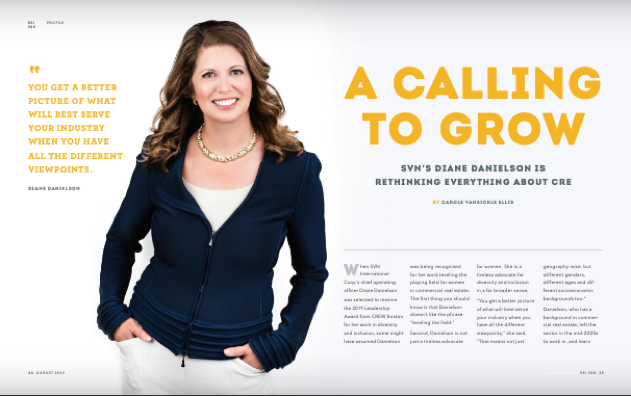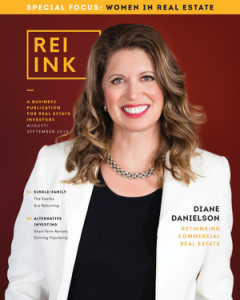SVN’s Leslie Bateman discusses how the talent and recruiting landscape in commercial real estate is changing, and how we can seize the opportunity it presents.
Rapid and continual advances in technology have been disrupting many of the sectors that anchor the U.S. economy, including the commercial real estate industry. However, the commercial real estate (CRE) industry has long been known to be slow to adapt, often “lagging behind” others when it comes to large-scale industry transformations. While other industries blaze forward to embrace technology and digital disruption, for the most part, CRE has only budged.
Experts suggest that this industry-wide delay in advancement is due in part to the age imbalance of the industry. This isn’t new information, as aging of the CRE industry is known and well documented: According to CIRE Reader Surveys and NAR Commercial Member Profiles, the average age of a CCIM member is 54 and the median age of a commercial Realtor is 60.1
In addition to age diversity, another area ripe for improvement lies in the adoption of new technologies. Much of the commercial real estate industry still relies on traditional methods of doing business, preferring the experienced and familiar over the new and risky. As a cyclical result, the industry has become less attractive to younger people, who often prefer organizations and job roles with a high degree of technology integration and support.2
What the CRE industry has now is an incredible opportunity — to harness new technologies, redefine its talent processes, and alter the trajectory for future success.

Digital Disruption, COVID-19, and CRE
Today, digital disruption is all-pervasive, leaving no industry untouched. Digital innovation has the power to change markets and economies, accelerate business operating models, and wholly reinvent the way business is done across the globe. While certain industries feel the profound influence of this digital transformation immediately, others – such as commercial real estate – are a little late to the game. With the surge of CREtech over the past two decades, CRE companies have begun building momentum by integrating technology with the built world and associated systems. However, at its slower pace and with nothing forcing it to move any faster, commercial real estate still largely remains behind.
Until the COVID-19 pandemic.
The global pandemic has changed the nature of office and work culture considerably, forcing all industries to adapt to remote work and rely on new methods and tools for virtual engagement and operations. Some companies (such as Spotify and Facebook) experienced cost-cutting epiphanies early in the pandemic, taking action after recognizing that the in-office concept simply won’t be necessary into the future.
While the pandemic has forced some CREtech innovations to flourish, it has also placed a magnifying glass on industry problems and shortcomings. For CRE, an industry still reliant on handshakes, years of experience and Rolodexes, the immediate shift to virtual work hasn’t been easy. The industry-wide disillusionment has accelerated the need for CRE companies to acknowledge, accept, and lean into major change. It’s not the catalyst we expected, but the pandemic has opened a large window of opportunity for the industry to make big strides toward a more prosperous future.
The Pre-Pandemic Talent Landscape
It’s becoming increasingly evident that, as CRE companies figure out the technologies required to support digitization shifts, they need to secure the right “talent” in order to accelerate the pace of adoption and implementation.
Prior to the pandemic, the talent landscape in CRE skewed heavily toward the Baby Boomer generation. There was little to no focus on recruiting Millennial and Gen-Z talent. In 2019, 45% of CRE employees were 55 or older compared to 4% in the 19–24 age range. In comparison, 24% of the workforce across all industries and 22% of the banking and insurance workforce were 55 years old or older.”2
This imbalance is both emphasized and continued as the industry prefers experienced hires, over-indexing on industry experience and comfort with traditional job roles. The outcome here is compounding: firms continue to contribute to the rift by favoring experienced hires and maintaining conventional practices; meanwhile, the industry becomes less attractive and less accessible to younger generations.

Preparing for the Workforce of the Future
To help companies attract and retain up-and-coming talent, reduce the demographic gap, and create a more fulfilling work environment, leaders will likely need to reexamine the talent function and its processes.2
As Deloitte Insights states: “The pandemic is expected to force a paradigm shift in the way the industry operates and how work is done. Digital transformation could play an important role as companies wrestle with liquidity and profitability in the near term and prepare for the post-crisis world. And so CRE companies should look at digital and talent transformation in tandem.”
While change is not easy and certainly not always comfortable, the sooner CRE companies understand and embrace the shifts they need to make, the better off they will be. Clearly, digital advancement is critical for CRE organizations’ success and relevance. The talent implications are vast.
CRE leaders must work to balance the talent landscape by rethinking and adapting to the way their employees work, embedding technology into their decision-making, and redefining skills, talent processes, and practices to meet new demands. The bottom line: Hiring younger talent is no longer optional, it’s essential.
At SVN, we often talk about “pulling the future forward.” This concept is so much more than a tagline. We live, breathe and practice this mentality daily through promoting a culture of learning, embracing remote work flexibility, hiring for location-agnostic roles, providing remote/online systematic training for new hires, and by believing in the powerful data on workplace diversity.
Diversity has long been a hallmark of the SVN brand and business model, and we strongly believe in the research proving that workplace diversity (e.g., gender, age, ethnic, cultural) leads to smarter teams and greater company success.3
Studies show that the most diverse companies are now more likely than ever to outperform less diverse peers on profitability4, and we’ve seen this firsthand at SVN.
To further underscore our company-wide belief in the power of diversity, here’s an inside look at SVN’s employee base:
· 73% women
· 40% minorities
· 53% under the age of 45
The Opportunity of a Lifetime
The COVID-19 pandemic has exposed unsustainable truths about the CRE industry’s approach to recruiting and retaining talent.
So now what?
If CRE firms want to find success in the future, many will need to step back to analyze and upgrade their current talent processes. Digitization, remote flexibility, and diversity should hold more weight in the talent landscape, and it’s time for us to do more than just acknowledge the known lags, more than just talk about where we can improve. It’s time for us to take action… to really make change.
In this challenge lies immense opportunity. For those in leadership positions, I challenge you to think about your own recruiting strategies, open roles, and growth goals. What adjustments can you make? Are some required skills now irrelevant with technology, and years of experience an arbitrary line in the sand? Are you willing to place your trust in the positive research on workplace diversity and prioritize it in your next hires? If these initiatives seem daunting, scary, overwhelming… you’re not alone. But just as we must trust in the data on diversity, we must also trust that great things rarely come from comfort zones.
As Virginia Rometty so eloquently states: “Growth and comfort do not coexist.”
Endnotes
1. CCIM Institute, “The Millennial Way,” accessed March 4, 2021
2. Deloitte Insights, “Preparing for the future of commercial real estate,” accessed March 4, 2021
3. Harvard Business Review, “Why Diverse Teams Are Smarter,” accessed March 4, 2021
4. McKinsey & Company, “Diversity wins: How inclusion matters,” accessed March 4, 2021







